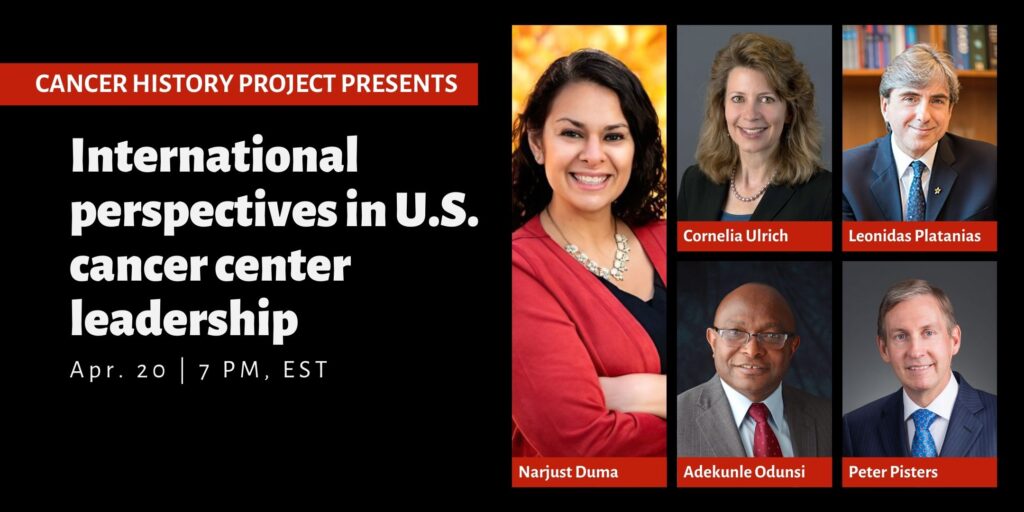From “garbage collectors” to the mainstream of medicine


- Jerome Yates: “We were like the Rodney Dangerfields of medicine in the late ‘60s.”
Cancer History Project | April 15, 2022
Jerome Yates became a cancer doctor during a time when medical oncologists were thought to be what he describes as “the garbage collectors of medicine.”
“The attitude among physician colleagues was, why are you wasting your time doing this? Not only are you wasting your time, but you’re making the patients sicker,” said Yates, 85, a retired oncologist who has practiced and administered research at Roswell Park Comprehensive Cancer Center, the University of Vermont, NCI and the American Cancer Society. “Some of them get very sick from the chemotherapy, because there are a lot of side effects with the normal tissues.”
During his internship at San Bernardino County Hospital, Yates, then 29, encountered a metastatic testicular cancer patient around his age. The young man was admitted to the hospital with congestive heart failure.
“They were going to let him die,” Yates said to The Cancer Letter. “I said, ‘If he came in and you didn’t know that he had metastatic cancer, you would treat him for his congestive heart failure.’ I convinced the attending. We treated him, and it bought him another four or five months. I thought it was an important four or five months.”
The prevailing attitude toward cancer treatment was depressing—“That if somebody had metastatic disease, had cancer spread around the body, that they were going to die, and why would you want to prolong their agony?”
In 1965, Yates encountered an optimistic article, “Obstacles to the Control of Acute Leukemia” in the CA: Cancer Journal for Clinicians, written by James Holland, an oncologist at Roswell Park Comprehensive Center.
He said that they were on the pathway to cure acute leukemia. “The way it was structured, and the timing—I was taking care of some chronically ill patients—and it just sounded like it was exciting,” he said.
Yates joined Holland at Roswell Park in 1968 and began conducting clinical trials with members of the cooperative group Acute Leukemia Group B cooperative group, the ALGB. This group, renamed the Cancer and Leukemia Group B in 1976, conducted clinical trials using two, three, or four-drug combinations. This strategy was not received kindly by the mainstream medical community.
“There was a general attitude that we not only didn’t know what we were doing, but what we were doing was potentially harmful to many patients,” Yates said.
Rather than embrace the work of the ALGB, cancer doctors largely adopted the thinking of William Dameshek, an influential hematologist at Harvard who was a mentor to many oncologists.
“His attitude was that we were poison pushers, that we were cowboys, that we were doing things that weren’t in the best interest of the patient,” Yates said. “Because he was extremely influential, we were viewed as outliers.”
Still, Yates remained hopeful—“because, as a physician, taking care of these patients—it made you feel good.”
Yates spoke with Alexandria Carolan, an associate editor with the Cancer History Project and reporter with The Cancer Letter. A podcast of the interview appears here, and a full transcript appears here.
Quote of the week
They still came to Roswell, because they knew that there was some hope there. A lot of what we did in those days, and a lot of what’s done today is, you provide hope to the patients that maybe you can make a difference.
Jerome Yates
April 20: International perspectives in U.S. cancer center leadership
Register today for a panel moderated by Dr. Narjust Duma, of Dana-Farber Cancer Institute, four directors of NCI-designated Cancer Center will discuss their unique perspectives as immigrants—and leaders in oncology. Topics will cover their unique pathways to leadership, diversity in medicine, and challenges faced by international medical graduates.
The panel will take place April 20 at 7 p.m. EST.
Moderator
- Narjust Duma, MD,
Associate director,
The Cancer Care Equity Program,
Thoracic oncologist, Lowe Center For Thoracic Oncology, Dana-Farber Cancer Institute;
Member of the faculty, Harvard Medical School
Panelists
- Adekunle Odunsi, MD, PhD,
Director, University of Chicago Medicine Comprehensive Cancer Center,
Dean for oncology, University of Chicago Biological Sciences Division,
AbbVie Foundation Distinguished Service Professor of Obstetrics & Gynecology - Peter WT Pisters, MD,
President, The University of Texas MD Anderson Cancer Center - Leonidas Platanias, MD, PhD,
Director, Robert H. Lurie Comprehensive Cancer Center of Northwestern University,
Jesse, Sara, Andrew, Abigail, Benjamin and Elizabeth Lurie Professor of Oncology, Departments of Medicine and Biochemistry and Molecular Genetics - Cornelia Ulrich, PhD, MS,
Jon M. and Karen Huntsman Presidential Professor in Cancer Research,
Executive director,
Comprehensive Cancer Center
at Huntsman Cancer Institute,
Professor, Department of Population Health Sciences, University of Utah
This column features the latest posts to the Cancer History Project by our growing list of contributors.
The Cancer History Project is a free, web-based, collaborative resource intended to mark the 50th anniversary of the National Cancer Act and designed to continue in perpetuity. The objective is to assemble a robust collection of historical documents and make them freely available.
Access to the Cancer History Project is open to the public at CancerHistoryProject.com. You can also follow us on Twitter at @CancerHistProj, or follow our podcast.
Is your institution a contributor to the Cancer History Project? Eligible institutions include cancer centers, advocacy groups, professional societies, pharmaceutical companies, and key organizations in oncology.
To apply to become a contributor, please contact admin@cancerhistoryproject.com.












